 | The Xenophile Historian |

 |
 |
 |
 |
 |
 |
 |
 |
 |
 |
 |
 |
 |
 |
 |
 |
 |
 |
 |
 |
 |
 |
 |
 |
 |
 |
 |
 |
 |
 |
 |
 |
 |
 |
 |
 |
 |
 |
 |
A History of Europe
Chapter 13: THE AGE OF INDUSTRY, PART II
1815 to 1914

This chapter is divided into two parts, which cover the following topics:
Part I
| The Congress of Vienna | |
| Cracks in the Metternich System | |
| The July Revolution and the Birth of Belgium | |
| The Rothschilds: Financial Royalty | |
| The German Confederation | |
| The Sonderbund War | |
| Demographics, 1815-1848 | |
| Britain Goes Industrial | |
| The Year of Unsuccessful Revolutions | |
| Two Steps Forward, One Step Back | |
| The First World's Fair | |
| The Unification of Italy |
Part II

The Iron Chancellor's Bag of Tricks
Before 1848, those who talked about a unified Germany probably would have expected the German-speaking states to unite under Austrian rule. After all, Austria was an empire already; the grandfather of Franz Joseph had also been the last Holy Roman emperor; Vienna was a famous cultural center. However, the Austrian Empire was almost as inefficient as the Holy Roman Empire had been, and its rulers were too preoccupied with Italy and the Balkans to be interested in ruling lands to the north and west of them. Meanwhile, Prussia had proven itself to be a well-run state, with productive farms in the east, a budding industrial center in the west (the Ruhr Valley), and the best-trained army in Europe. Therefore Prussia may have been seen as an upstart state in the eighteenth century, but when 1848 came around, German nationalists looked to the king of Prussia for leadership. Unfortunately for them, as we saw, Frederick William IV wasn't interested in uniting Germany; the nationalists would have to wait until Prussia got leaders that were interested.
Frederick William suffered a series of strokes in 1858, making him unfit to rule, and his brother Wilhelm I (William I) took his place. Two years later the new king went to Parliament and introduced a program to overhaul the army. The liberal-run houses of Parliament were in favor of a larger army, but only if it was their army; they refused to give Wilhelm the funding he needed until he agreed to give them control over the military budget. The king wouldn't do this, and the resulting deadlock left the government paralyzed for the next two years.
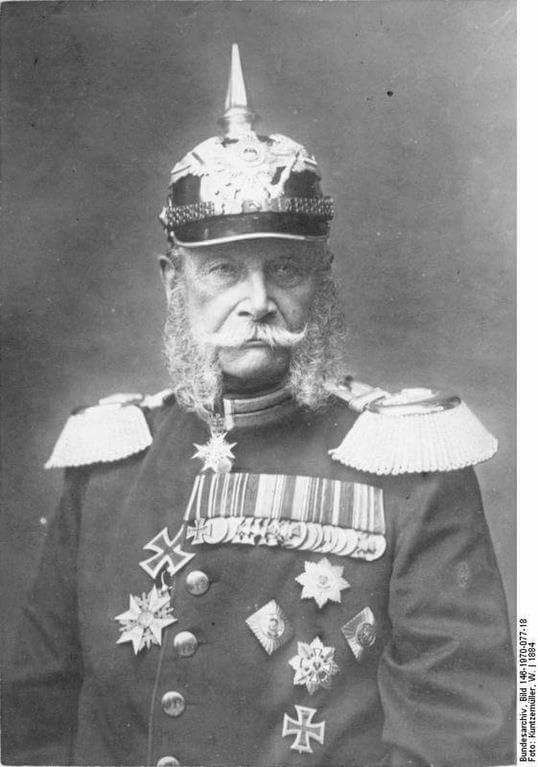
Wilhelm I. From a photo taken in the 1880s.
Politician after politician tried to break the impasse, but neither the king nor Parliament was interested in compromise. By 1862 it had gotten so bad that Wilhelm considered abdicating in favor of his son, Frederick III. But Frederick was a liberal and the husband of Queen Victoria's eldest daughter; he would probably turn Prussia into a British-style constitutional monarchy. In desperation Wilhelm's advisors appointed Otto von Bismarck, an ambassador known for championing a strong, conservative Prussia, as chancellor (prime minister). The promotion wasn't a tribute to his ability, but came about because nobody else wanted the job. Many saw Bismarck as a wild man who would make some disastrous blunder, forcing the king to come to terms with Parliament. Wilhelm thought he was too reckless, and his wife, Queen Augusta, loathed Bismarck, but after a personal meeting with the new chancellor at the summer palace, Wilhelm tore up his letter of abdication.
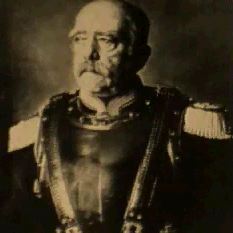
Otto von Bismarck.
Bismarck surprised people with the way he handled the crisis so smoothly. He proceeded to collect the additional taxes needed for the military reform based on the 1861 budget, without the approval of Parliament. He defended this move by arguing that the government must continue to function, regardless of what the politicians were doing. Since the constitution did not explain what to do when a new budget did not exist, he would have to apply the preceding year's budget. Liberals were enraged by his behavior, but memories of 1848 were strong enough to make them swallow their pride and support Prussian nationalism. Boldly, Bismarck gave Parliament a chilling address that would set the tone for Germany's unification:
"Germany does not look to Prussia's liberalism, but to her power . . . The great questions of the day are not to be decided by speeches and majority resolutions--therein lay the weakness of 1848 and 1849--but by blood and iron!"
In 1863 King Frederick VII of Denmark died and the Schleswig-Holstein question could not be put off any longer. With Frederick's death the main branch of the Oldenburg dynasty became extinct; German law now said that the rightful heir to the duchies was not the next king of Denmark, but a former pretender to the Danish throne, Frederick the Duke of Augustenborg. The new Frederick thus changed his name to Frederick VIII of Schleswig-Holstein. To the south, the Germans supported Frederick's claim, and when Denmark announced it would not let Schleswig-Holstein become independent without a fight, the German Confederation found itself in a war, but with no army to fight it. All it could do was ask its two senior members, Austria and Prussia, to invade the duchies on the Confederation's behalf, trusting that when hostilities were over the disputed land would be turned over to the Duke of Augustenborg.
Franz Joseph of Austria and Prussia's Wilhelm I were trustworthy, but Bismarck was not; he wanted Prussia to have the duchies. He couldn't just take them, because the Prussian army was moving in the name of all Germany, but if he acted as an agent of the Confederation he would have no control over any political settlements made. Bismarck's solution to this dilemma was to get the Confederation members who summoned Prussia out of the conflict; he did this by engineering a quarrel with Prussia and Austria on one side and the minor German states on the other. Consequently, when the brief German-Danish War took place in 1864, Austria and Prussia fought with no commitments, except to each other. The time was long past when Denmark could defend itself against one major power, let alone two major powers, so the Danes were quickly overwhelmed and forced to cede the duchies to the invaders.
At this point everyone else, including Franz Joseph and Wilhelm, still thought the duchies ought to go to Frederick, but Bismarck kept them talking long enough to consider other ideas, like a partition between Austria and Prussia. In 1865 it turned out that the joint administration of the duchies was causing so many problems that a division along these lines did take place--just as a temporary measure, of course--in which Prussia got Schleswig, Austria got Holstein. Not long after that, Bismarck expressed alarm over the way the Austrians were running Holstein, and sent Prussian troops into that state. Realizing that Holstein was useless to them, the Austrians turned to the Confederation and urged it to mobilize against Prussia. In doing so they broke their 1864 agreement with Prussia, allowing Bismarck to claim he was the injured party when he declared war on Austria. Most of the Confederation sided with the Austrians, but Bismarck managed to offset this by persuading the Italians to attack Austria's southwestern frontier.
Considering that the 1866 war in central Europe involved three major states and several minor ones, it was surprisingly short and decisive; it lasted just seven weeks. Credit for this is rightly given to the Prussian chief of staff, Count Helmuth von Moltke, for his plan of a converging attack on Bohemia from three directions. The Army of the Elbe marched through Saxony to invade Bohemia, while the Prussian First and Second Armies attacked from Silesia. The Austrians missed their best chance to win by not taking on the three Prussian armies separately; they withdrew gradually for the first three weeks and when they finally chose to make a stand, at Sadowa, Moltke had all three armies close enough together to use them in the same battle. It was a perfect flanking maneuver; the Army of the Elbe and the First Army engaged the Austrians head-on, and the Second Army struck on the Austrians' right flank. The Austrians were routed and fled to Vienna, with Moltke in close pursuit. Three weeks later the Prussians were knocking at the gates of Vienna; one week after that Franz Joseph agreed to a truce. The "humiliation of Olmutz" had been avenged.
There were other campaigns in the Seven Weeks War, but none of them were as important. A newly raised Prussian army proved adequate against the hostile members of the Confederation; it occupied Hanover and defeated Baden, Wurttemberg, and Bavaria. The Austrians trounced the Italians on both land (at Custozza again) and sea (near Lissa in the Adriatic), but they still had to hand over Venetia to Italy. Bismarck took no Austrian land for Prussia, because his main goal was to get Austria out of the Confederation, not to conquer it; by not humiliating Austria, he made it possible for Austria and Prussia to get along in the future.
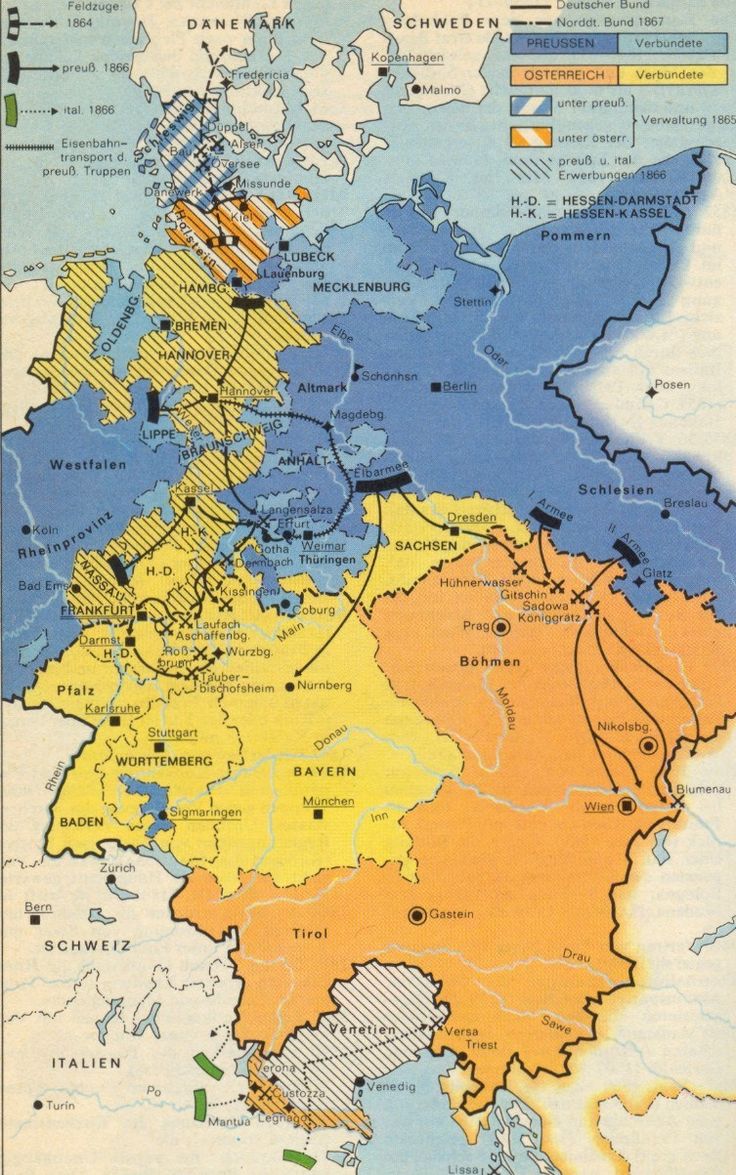
After the Seven Weeks War there was no doubt as to who was master in Germany. Prussia not only got Schleswig and Holstein, but the territories of five opponents: Hanover, Nassau, Hesse-Cassel, Hesse-Homburg and Frankfurt. This united Prussia's original Brandenburg territory with the one it had on the Rhine. Moreover, the original German Confederation was dissolved and the remaining states north of the Main River were enrolled in a "North German Confederation," which Prussia dominated completely. Only seven states from the old confederation remained fully independent of Prussia: Austria, Liechtenstein(13), Luxembourg, Bavaria, Wurttemberg, Baden and Hesse-Darmstadt. Bismarck and Moltke between them had obtained for King Wilhelm five million new subjects, and the allegiance of five million more. This meant enough men for three additional army corps. Parliament retroactively voted to legalize Bismarck's appropriation of the military budget over the previous four years, and rewarded him with a cash prize that he used to buy a 14,825-acre estate in Pomerania; this land included a paper mill and a distillery, so it gave Bismarck both a private retreat and a source of considerable income.
Meanwhile to the west, the king of Holland wanted to sell Luxembourg, and Napoleon III saw this as his chance to expand the frontiers of France to the Rhine. The French emperor had met Bismarck at a conference in 1865, and Bismarck gave vague promises about what the French could have: "Perhaps the [Bavarian] Palatinate and the Rhine frontier, perhaps Luxembourg, perhaps part of Belgium or Switzerland"--if France would stay out of the upcoming war with Austria. Napoleon agreed and when the Seven Weeks War ended, he approached Bismarck for his reward, but now the German leader said that he did not remember making any promises about this. Frustrated and offended, Napoleon insisted that Prussia approve France's annexation of Belgium; Bismarck cleverly asked the French envoy to put this demand in writing, but still avoided giving a definite response. Four years later Bismarck would send the document to the British, thereby persuading them not to support the French in the Franco-Prussian War.
Still not satisfied with Bismarck's response, Napoleon settled for buying Luxembourg. When word of the planned purchase got out, it caused an immediate outcry in Germany. Luxembourg had been a member of the old German Confederation and whether or not it was part of Bismarck's new one, German nationalists couldn't stand the thought of letting it go to the French. It took an international conference, held in April 1867, to defuse the Luxembourg crisis. There Bismarck told Napoleon that he was sorry, but despite what he said in the past, he couldn't allow the transaction to take place; as a peace gesture, he neutralized Luxembourg by withdrawing the Prussian garrison stationed there. This turned out to be one of his neatest tricks, for he had done nothing to discourage the pan-German trumpeting that went on during the affair. By giving up whatever claim he had to Luxembourg, Bismarck won the support of the south German states. In the past, Bavaria, Wurttemburg, Baden and Hesse-Darmstadt, all Catholic states, would have been likely to support Austria or France in a dispute with Prussia; now they all agreed to put their armies at Prussia's disposal in the event of war with France. This gave Moltke the equivalent of three more corps.
Prussia could now field an army twice the size of France's, a fact which did not escape Napoleon's attention; his famous uncle had said that God was on the side of the big battalions. But when he tried to adopt the Prussian system of drafting every able-bodied man for military service, his generals gave him a point-blank refusal; if there was money available, they said, it ought to be spent buying breech-loading rifles for the regular forces. When the armies of Europe had switched over from the musket to the rifle in the 1840s and '50s, the French, like nearly everybody else, had chosen a muzzle-loading weapon; the Prussian choice of a breach-loader was seen as odd. The Seven Weeks War demonstrated beyond a doubt that the Prussians had been right; for every shot the Austrian rifleman had fired from his muzzle-loader, the Prussian with his breach-loader had fired five. To the French officers, this crushing tactical advantage (not Moltke's strategy) was the reason for Prussia's success, and breach-loaders were what they wanted the most.
The French acted on this assessment; between 1866 and 1870 they produced a million breach-loaders, of a design that had a longer range than the Prussian one. If the speed was remarkable, the need for it was obvious; the two countries clearly wanted a war.(14)
The Franco-Prussian War
It was France that forced the issue. Napoleon III realized too late that Prussia had replaced France as the foremost military power on the Continent. And one of the rules in the great power game was "Don't let another nation gain an overpowering advantage," so everyone expected Napoleon to do something about it. Unfortunately his best chance to cut Prussia down to size--the Seven Weeks War--came when he had his hand caught in a trap on the other side of the Atlantic, using the French army to set up an emperor in Mexico. After he brought his troops home, he looked for another chance to stop Bismarck. He almost started a war over Luxembourg for that reason, and when war actually broke out, it was caused by an even more trivial matter: an early 18th-century-style succession dispute.
In 1868, a Spanish revolution sent Queen Isabella II into exile, and two years later the Spaniards offered the vacant throne to Leopold, a distant relative of Wilhelm I. The French wouldn't stand for it; having Hohenzollerns facing France from the Pyrenees as well as the Rhine was too much for them. So great was the uproar that Wilhelm quickly withdrew Leopold's candidacy, but for the French foreign minister that wasn't enough; he had the French ambassador follow the king of Prussia to Ems, a health spa in northwest Germany, where he demanded that Wilhelm put in writing a promise to never again seek to put Leopold on the throne of Spain. Wilhelm simply repeated that Leopold was no longer a candidate, and dismissed the unreasonable request.
Afterwards, the king of Prussia sent a telegram describing the meeting to Bismarck, asking him to share the details with the press. Bismarck did so, but he gave the reporters an edited version of the telegram. The original telegram had contained nearly 200 words; Bismarck cut out almost half of them, basically removing all the flowery language that diplomats love. What remained in the message stuck to the facts, but it sounded like the ambassador had insulted the king and that the king had responded the same way. As it went out all over Europe, Bismarck proudly announced, "It will have the effect of a red flag on the Gallic bull," and sure enough, France declared war.
Napoleon III issued the war declaration because he thought the French army was invincible, and figured a "sure victory" would be just the thing to restore his sagging popularity at home. Bismarck did what he could to make the verbal exchange violent, because war with France was the quickest way to bring southern Germany into the Prussian camp. Most Germans, including Bismarck, expected Prussia to win, but foreign opinion favored the French for two reasons: the French army used professional soldiers, as opposed to conscripts, and it had a Napoleon leading it.
That second factor was no longer the advantage it had once been. As many ladies of the court could testify, Louis Napoleon had greatly enjoyed his eighteen years as emperor. Unfortunately, his campaigns in the bedroom had left his body so ravaged by disease that he was no longer fit to lead campaigns in the country. The army was looking for the nephew of Austerlitz, or at least the man of Magenta. What it got was a sick old man who found it so agonizing to sit on a horse that he couldn't make any sort of decision.
Before the fighting began, Bismarck completely outfoxed Napoleon on the diplomatic front. We noted previously that he kept the British from entering the war on the side of the French by revealing Napoleon's designs on Belgium (shades of Waterloo!). He never had to worry about Russia because he had befriended the Russians in 1863, with a promise to support them in any future problems over Poland; besides, the Russians remembered the Crimean War, so they wanted nothing to do with Napoleon. Austria was neutralized by a reminder that France had been making secret deals with Prussia in the Seven Weeks War, when it should have been helping Vienna, while Bismarck won over the Italians by offering his assistance in getting the French out of Rome. None of these promises cost Bismarck anything, and by 1870 France was isolated.
The first consequence of the war was far away from the action: Napoleon recalled the French garrison from Rome. For years he had been looking for a graceful way to end his commitment to the Papacy; now military necessity gave him the excuse he needed. The French army marched out, Italian troops marched in, the Eternal City became the permanent capital of Italy and the Pope was left with a handful of buildings in or near Rome.(15)
Within three weeks of the declaration of war Moltke moved fourteen of his fifteen corps to the French frontier, lining them up between the Moselle and Rhine Rivers. The French army, which had eight corps, moved six of them to the same district (Lorraine). Overall the Germans had a 2:1 advantage, 400,000 men to France's 200,000. However, each army deployed the bulk of its troops on its left flank. What this meant was that the forces became nearly equal on the French left, but there was a 4:1 German superiority on the right end of the French line. These were decisive odds. The French won the first battle, a skirmish at Saarbrücken (August 2, 1870), but in the battles that took place over the next four days (Weissenberg, Wörth and Spichern), the two French corps on the right were so badly mauled that they had to withdraw to Chalons. That left the road into France wide open.
As the Germans moved forward, the French left had to retreat, too, but it did so in good order, reaching its main base, the fortress of Metz, without significant loss. However, these five corps could not halt the German advance by themselves; a minimum of eight or nine would be needed for that. Napoleon left Marshal Achille François Bazaine in charge and hurried to Chalons. Recruiting brought the strength of the "Army of Chalons" to four corps; Napoleon, unable to even pretend he was directing operations, gave up command to another marshal, Marie Edmé Patrice Maurice, the comte de MacMahon. The idea was for Bazaine to fall back on Chalons and for the two marshals to use their combined nine corps in some masterly, though as yet unformulated, counterstrike.
Unfortunately Bazaine stayed in Metz too long. By the time he started to pull out (August 14), a German column was moving alongside of his, only a dozen miles to the south. On the 16th, at Rezonville, there was an accidental battle which made everyone realize how close the Germans were getting; by the 18th Moltke had eight corps between the two French armies. On that day the bloody battle of Gravelotte showed Bazaine that he would not be able to fight his way back to Chalons; if the French armies were going to be united, MacMahon would have to come to him.
MacMahon and Napoleon set out from Chalons on the 21st. By the 25th Moltke figured out where the Army of Chalons was, and those Germans not involved in shepherding Bazaine back to Metz wheeled north to head it off. On the 29th he encountered MacMahon's right flank and forced him off his line of march the next day. MacMahon halted in the town of Sedan, intending to rest up and then try again, but while he planned his next orders his generals were marking the locations of the Prussian campfires on their maps. They made a complete circle around the town.
On the next morning (September 1), Moltke established his headquarters on a hillside with a good view of Sedan; there he, King Wilhelm and Bismarck watched from horseback. It didn't take long. The big guns stopped firing in the early afternoon, and a French officer brought a message of surrender: "Since I was not able to die in the midst of my troops, it only remains for me to surrender my sword to the hands of Your Majesty. I am Your Majesty's good brother, Napoleon." Though suffering from a kidneystone the size of a pigeon's egg, Louis Napoleon had put on rouge (to hide his grey skin color) and ridden into battle, hoping for a quick and glorious death. Instead he and 83,000 Frenchmen became prisoners of war; with that the story of the Second French Empire was over.
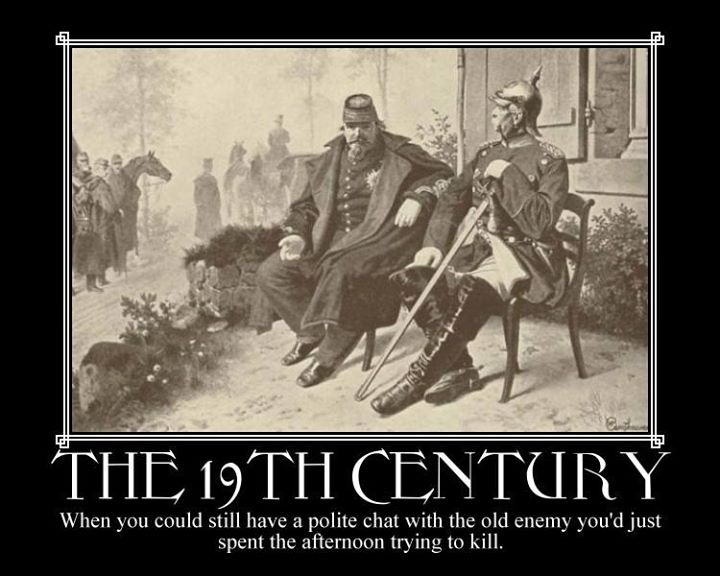
Napoleon III meeting with Bismarck, after he surrendered.
The people of Paris proclaimed the Third Republic as soon as they heard the news of Sedan. In the accompanying euphoria the idea somehow got around that with Napoleon gone, the Germans would go home and leave the French to work out their new destiny. The truth was far different. Bismarck didn't care what kind of government the French had, peace was going to cost them dear. By the time the Parisians accepted this ugly fact, the Prussians were at the gates of the city. While both sides drew up siege lines, Leon Gambetta, the interior minister of the new republic, escaped the capital in a balloon.
Gambetta's plan was to raise enormous conscript armies in the provinces and simply sweep the Germans out of the country. It was true that Moltke, with most of his forces either committed to the siege of Paris or watching Bazaine in Metz, had little left for dealing with a counteroffensive. On the other hand Gambetta didn't have time to turn his conscripts into soldiers. Miracles of logistics produced an "Army of the Loire" of four corps by the beginning of November, and it routed a German army near Orléans when first used, forcing the Germans to abandon the city. This encouraged Gambetta to try linking his new army with the besieged one in Paris, but the republic's first president, General Louis Trochu, was a monarchist, while Gambetta was a leftist, so they couldn't get along or coordinate their actions. What's more, when it came to real battles there was a world of difference between the raw French levies and the battle-hardened German troops. The Army of the Loire's attempt to drive north from Orléans to Paris was easily held, as was the Paris garrison's attempt to break out of Paris and meet the relieving force (both at the end of November); neither caused Moltke to lose any sleep. He didn't even have to use the forces set free by the capitulation of Metz in October.
Moltke's plan for Paris was to simply starve it out. This would obviously take time and since foreigners were starting to feel sorry for the French, Bismarck pressed for a bombardment. He got his way and the big guns began to fire on January 5, 1871. They did little to speed up the outcome, though, and when Paris surrendered on January 28, it did so because it had only ten days of food left. Near the end of the siege, meat was so scarce in Paris that for those who could afford it, the chefs served up fancy recipes made from the animals of the city zoo. The armistice was extended to the rest of France on January 31.
Temporarily excluded from this truce was the area nearest the Swiss frontier. The French had produced an "Army of the East" to liberate the territories of Alsace and France-Comté and when its initial advance to the fort of Belfort went in their favor, the French, desperately needing a success, demanded that this battle be fought to its conclusion. It proved to be a fiasco; most of the 150,000 Frenchmen involved got pushed into Switzerland, where the Swiss disarmed and interned them.
Bismarck had his way completely with the peace treaty ending the war: France had to give up Alsace and Lorraine and pay an indemnity of five billion francs ($1 billion). German troops occupied the northern half of France until that indemnity was paid off, in 1873. Still, Bismarck was proudest of another accomplishment. Ten days before the surrender of Paris, the German princes met in the Hall of Mirrors at Versailles and hailed the king of Prussia as their overlord. As Napoleon III--who hid his diminished head in England until his death in 1873--passed into history, a German empire was born, and King Wilhelm I of Prussia became the first Kaiser (Caesar) of the Second Reich.(16)
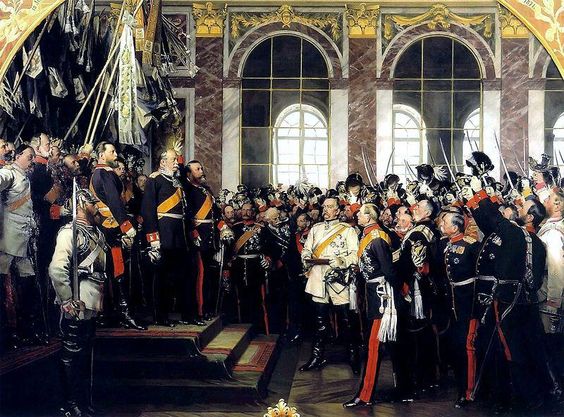
The Paris Commune
When it became clear that Paris was going to be besieged, the city authorities, acting in the best revolutionary tradition, issued rifles and cannon to the people. This didn't make a difference in the military situation, but it made everyone feel better--except for members of the middle and upper classes, who were more frightened of the working class than they were of the Germans. In fact, the real reason for the National Guard was not to defend the city, but to help the workers; its exercises gave the unemployed something to do, its rations fed them and its meager pay gave them a little security. The trouble came with peace and demobilization, especially when the government made a blundering attempt to deprive the Guard of its artillery. The general sent to get the guns was seized and shot by an angry mob, which then swept down on the Hotel de Ville. Surprisingly, it met no opposition. The ministers of the Third Republic had abandoned their unruly capital, leaving Paris to the rebels and their devices. Meanwhile the rebels elected their own government, the famous Paris Commune, and started to put together a socialist program, the first ever enacted in Europe (March 26, 1871).

One of the barricades set up in Paris. Taken on March 18, 1871.
The government's retreat was more sensible than it seemed. It had the overwhelming support of the country (it had only been elected a month before, so there was no doubt about this) and, once it set up its headquarters at Versailles, the regular army rallied to it. Meanwhile the Commune members argued at every day's meeting, and when they weren't building barricades and drafting men to fill them, they kept themselves busy with impractical matters, like publishing manifestoes and tearing down the Vendôme column (a 155-foot-high monument built by Napoleon I in 1810).
To get enough soldiers to take back Paris, the Republic made an amazing deal with the Germans. Bismarck didn't want the Commune infection to spread to German socialists, so he released the 400,000 French prisoners he was holding, and warned the Republic's leaders to bring down "Red Paris" fast, or Germany would do it. In April Marshal MacMahon began a new siege of Paris, and on May 21 the army broke in. It took barely a week for the government's soldiers to confine the rebels to the northeast corner of the city; the final battle was a one-sided affair in which the Communards were massacred whether they surrendered or not. Altogether nearly 25,000 were killed; the Commune shot several hundred real and suspected enemies of the revolution, but four fifths of the atrocities were committed by the government when the second siege of Paris ended.
At first Karl Marx hailed the Commune as the "dictatorship of the proletariat" which he had been predicting for a generation. However, only a fraction of the Communards were real communists; the rest were a collection of socialists, republicans, and latter-day Jacobins with nostalgic memories of the first French Republic. Consequently they were more interested in establishing wage-price controls and better working conditions; Marx was left wondering why they didn't do something truly revolutionary, like confiscating the $2 million held by the Bank of France. The Commune's disastrous end confirmed his low opinion of socialists; they simply weren't hardheaded enough to run a successful revolution. On the other hand, it turned many socialists from bullets to ballots. Soon many saw this as the wave of the future. By 1871 the working class could see that life was getting better: the cities were healthier places to live, children worked in schools instead of coal mines, trade unions were legalized, and wages were going up. Socialists started reasoning that if they had universal suffrage, they could outvote everybody else, and socialism would come without revolution.
Britain continued to extend voting privileges to its citizens; in 1867 new legislation gave one out of every three Englishmen the right to vote. In Piedmont, the Netherlands, Denmark and Prussia, the constitutions granted in 1848 survived the reaction of the 1850s, so they all had large numbers of voters, ranging from 10% of the adult male population (Piedmont) to nearly 100% (Prussia & France); all voted for legislative assemblies which wielded significant influence, even if they didn't have much real power. Only Russia continued to practice the old and dangerous forms of repression. In the Italian case political progress was particularly striking, because Italy's unification spread the authority of the Piedmontese constitution to territories that had once been home to some of the most reactionary governments in Europe.
In France, despite the humiliations that caused the birth of the Third Republic, democracy had survived. Marshal MacMahon, who became president in 1873, proposed bringing back a Bourbon king. However, the citizens of Paris did not want a return to the old ways of the past, so in 1875 the Chamber of Deputies voted to keep the Republic, since it seemed a safe middle-of-the-road approach between the monarchists and the socialists. The conservatives got a suitably meaningless monument in the form of the Sacre Coeur (built on the site of the gun park where the Communards began their 1871 uprising), and the mood that favored turning back the clock back began to ebb.(17)
Demographics, 1848-1871
Between 1848 and 1871 the Russian Empire's population grew from 70 to 90 million, or more than 25%. In growth the United Kingdom came in second place (+15%), because Ireland had lost so many people. Consequently Russia now had more than twice as many people as the second largest European nation, Germany (41 million). Pushed down to equal third (from equal second) were France and Austria, who both still had 36 million; neither made a gain because their territorial losses (Alsace-Lorraine in the case of France, Lombardy and Venetia in the case of Austria) cancelled out their natural increase. The United Kingdom now ranked fifth (31.75 million), followed by the Turks (29 million), Italy (26.75 million), and Spain (16.5 million).
These population rankings meant a lot to the generals and politicians that came along after the Franco-Prussian War. The war had shown that a large conscript army, when properly equipped and led, can beat a small professional one. Maybe an island kingdom like Britain didn't need a large army, because its defense needs were largely met by the Royal Navy, but the continental nations paid attention to this lesson; within a few years they all passed laws making military service compulsory. Manpower had replaced skill as a key resource and generals went for census reports like schoolboys after comics; in the charts of the demographer they saw the army corps of the future.
The introduction of conscription changed the balance of power in favor of the Russians and the French. Russia, written down after it lost the Crimean War, began to be rated up again; not only did she have a seemingly inexhaustible supply of cannon fodder, but once the Russian railroads were completed, she could, in theory, begin to deploy them effectively. In the west conscription removed the German advantage over the French. Moltke figured that France would be a tough opponent in any future war because there would be so many French divisions drawn up along a new and shorter frontier that it would be impossible to fight through them. It followed from this that if Germany had to fight a two-front war, the best strategy would be to stand on the defensive against France and go for a quick victory against the other opponent. When Moltke retired in 1888, this was the plan that he bequeathed to his successor.
In 1867 the Hapsburgs changed their empire's name from Austria to Austria-Hungary. Franz Joseph recognized that something had to be done to strengthen his nation after the defeats of 1859 and 1866, so he reached an ausgleich (compromise) with the Hungarians that made them partners. Overnight Hungary changed from one of the empire's most dangerous provinces to a loyal state with a government of its own, while Franz Joseph retained control over the military and was the ultimate head of state in both Vienna and Budapest. Franz Joseph also gave the Hungarians control over half of the empire's minorities: the Slovaks in the north, the Croats and Serbs in the south, and the Romanians in Transylvania. "You look after your barbarians, and we will look after ours," is how the Austrian Chancellor Beust reportedly explained it, to the leading Hungarian official at the settlement. Because the new constitution emphasized the differences between the Austrian and Hungarian dominions, we often call Franz Joseph's government the Dual Monarchy.
Like Franz Joseph, the Dual Monarchy lasted longer than anyone expected. This was partially because the Austrians had lost nine-tenths of their most troublesome minority, the Italians, partly because the Hungarians were every bit as ruthless at suppressing dissent as the Austrians had been--some would say more so--and partly because the Slavs weren't politically active yet. Nevertheless, a solution like the Dual Monarchy would have been more suitable in the Middle Ages, and Franz Joseph knew it. Near the end of his reign he remarked, "I have known for a long time how much of an anomaly we are in today's world."
In the economic sphere England remained dominant. The British Isles still produced 60% of Europe's coal and iron, about the same percentage as a generation earlier. Other countries were now catching up as far as railroads were concerned, but this had to do more with their size than their technology; Germany and France obviously needed more miles of tracks to connect their cities than the United Kingdom did. And this fact doesn't point out the extra advantage given by British capitalism, for whereas Britain's railroads were built and paid for by businessmen, the German network was partially financed by the army.(18)
Bismarck's Peace
Now that Bismarck had everything he wanted, he devoted the rest of his active life to promoting peace. To do this he made as many treaties as possible between Germany and her neighbors; he also stopped every attempt by the revenge-minded French to make friends. The most important agreement was a mutual defense pact, signed with Austria-Hungary in 1879; it promised that if either country was attacked, the other would come to its aid. When Italy joined the pact in 1882, it became known as the Triple Alliance. At home Bismarck used pan-German nationalism to unite factions that normally didn't get along: landowning Junkers with Ruhr industrialists, the Protestant north with the Catholic south, socialists with conservatives. In all these actions he was successful. The result was that across most of Europe there were no wars between 1871 and 1914, and most changes on the map were done with the agreement of all parties concerned (see the 1878 Congress of Berlin below).
The peaceful changes that took place will all be covered in this section. Western Europe saw the restoration of two countries: Luxembourg and Norway. In 1890 Luxembourg became independent of the Netherlands because all three of the Dutch king's sons had died before him, and the Dutch crown went to his daughter, Wilhelmina. Luxembourg--like the other German states--prohibited female inheritance of titles, so this forced a break like the one between Denmark and Schleswig-Holstein. Fortunately there was a distant relative of the Dutch royal house available; Adolphe, Duke of Nassau, had lost his minor German state because he picked the wrong side in the 1866 war between Prussia and Austria, and Prussia annexed his state. Now he was seventy-three years old, and thus only ruled Luxembourg until 1905. His son William IV would change the inheritance laws so that a daughter could become grand duchess if her father had no sons, and that has allowed the same family to rule Luxembourg since then.
Norway's restoration was a bit more complicated. For ninety-one years Sweden ran Norway with a semi-independent Norwegian cabinet and parliament in Oslo (then called Christiania). Still, the union had never been popular in Norway, and from 1895 onward tensions grew between Oslo and Stockholm. Matters came to a head in June 1905, when the Norwegian cabinet resigned over a disagreement with Oscar II, the king of Sweden. The king was unable to form a new cabinet, and the Norwegian parliament voted unanimously to end the union with Sweden. In response, Oscar said he would only accept this break if the Norwegians held a referendum on whether or not they wanted independence. Well, the Norwegians were already getting a referendum ready, and when it was held in August, the result was also near-unanimous: 368,208 voted (99.95%) in favour of dissolving the union and only 184 (0.05%) wanted to keep it. Because women did not yet have the right to vote, Norwegian women expressed their feeling with a petition calling for dissolution, and it collected 279,878 signatures. At the same time Oscar learned that a majority of Swedes favored letting Norway go, and they would oppose military action to preserve the union, meaning the king could not trust his own troops if he marched them into Norway. Consequently the revolution in Norway was a non-violent one, and negotiations followed, which ended in October with the king renouncing his claim to the Norwegian throne.
Now who would run the new Norwegian state? Since most of the nearby countries had a constitutional monarch as the head of state, the Norwegians quickly decided to get a king. But there had not been a native Norwegian king since 1387 (see Chapter 9), and nobody in modern Norway could claim to be a member of that extinct dynasty. Some suggested giving the crown to a Swedish prince who was not in line for the Swedish throne, but Oscar made it clear when he renounced his claim that no one else from the Swedish royal family could have it. Therefore the Norwegians decided to offer the crown to Prince Carl of Denmark. Carl was thirty-three years old, and the second son of the crown prince of Denmark (the future King Frederick VIII) and Princess Louise of Sweden. Louise was a niece of Sweden's King Oscar, so Carl was related by blood to both the Danish and Swedish royal families. Moreover, Carl was married to Maud, the daughter of England's Edward VII, so the British would surely support him coming to power, and Carl had a two-year-old son named Alexander, promising that there would be a peaceful succession when his reign ended.
With all that going for him, you would think that Prince Carl would accept the Norwegian offer without hesitation. But he had never expected to become king of anything, and when he was a kid he chose to pursue a military career; now he was a junior officer in the Danish navy. To resign his commission and take the Norwegian crown, Carl first had to get permission from his grandfather, the current king of Denmark. And because he knew that some people (mainly socialists) did not want a monarchy for Norway, he also made his acceptance conditional on a referendum that approved of him becoming king. That referendum was not as lopsided as the previous one, but the result was still a landslide, with 79 percent voting "Yes" for Carl. Thus, Carl sailed for Oslo with his wife and son in late November 1905, and was crowned king in the following year.
Once he arrived in Norway, Carl became an enthusiastic supporter of Nowegian culture. To start with, he changed his name to Haakon, because the last fullblooded Norwegian king was named Haakon VI. He also gave his son an authentic Norwegian name, Olav. His personal motto became "Alt for Norge", meaning "All for Norway." Fridtjof Nansen, the polar explorer, introduced the king and queen to the national sport, skiing, so all Norwegian kings have learned how to ski since then. On the other hand, Haakon never became fluent in the Norwegian language, and preferred to speak Danish for the rest of his life. Nevertheless, the Norwegians learned to love their new king, and were encouraged that his reign lasted more than half a century, through and beyond both World Wars (1906-57).
Now let's get back to Europe in Bismarck's time. One part of the continent that even Bismarck could do little about was the Balkans. Lacking both industry and democratic institutions, this region resembled Asia more than it did western and central Europe. Because Russia had been prevented from moving in to fill the vacuum left by the expiring Ottoman Empire, a number of petty states arose that hated each other and could never be satisfied with the borders that were redrawn after every war. So unsolvable was the Balkan problem, that it produced a new word to describe political disunity: Balkanization. In 1877 the Russians made a second attempt to destroy the Turks (the Russo-Turkish War), and when the British threatened to get involved on the sultan's side, Bismarck invited representatives of all interested nations to come to Berlin and iron out their differences there. Thus, Serbia, Montenegro, and Romania all joined Greece as independent Balkan states. The Bulgars got two autonomous states, named Bulgaria and East Rumelia. Since the three Turkish provinces of Bosnia, Herzegovina and Novipazar had been the cause of that war, Austria-Hungary occupied them and set forth on a ferocious campaign of "pacification," designed to eliminate any hint of dissent or potential dissent. The British and French were satisfied with territorial gains far from the action (Tunisia for the French, Cyprus for the British), and while Germany didn't claim anything this time, Bismarck mended the bad relations that had existed between Germany and Austria-Hungary since the 1866 war.
The next scuffle was the Bulgar-Serb War of 1885. This started when the Bulgars announced, in defiance of the Berlin settlement, that their two states would unite into one; the Serbs, prodded by the Austrians (both wanted a weak Bulgaria), immediately challenged them but met military defeat. Such is the "strange bedfellows" nature of diplomacy that in this conflict Britain supported Bulgaria and Russia (which had become the Serbs' main backer since 1878) upheld the sanctity of the Berlin terms. Eventually common sense prevailed and the Bulgars were allowed to bring the two halves of their country together.
After that there was a thirty-day war between Greece and the Turks in 1897, that resulted in slight territorial adjustments. Bismarck died a year later, so he didn't see Europe's next major war, but he correctly predicted that the cause of it would be "some damned foolish thing in the Balkans."
Under Wilhelm I, Bismarck was a virtual dictator. That ended with the kaiser's death on March 3, 1888, three weeks before his ninety-first birthday. For many years the German people had looked forward to Frederick III taking the throne, because he preferred art and culture over military matters, and Bismarck dreaded that day for the same reason. This did not mark the beginning of a liberal reign, though, for Frederick had throat cancer, and succumbed to it after ruling for only ninety-nine days; he was in turn succeeded by a bombastic twenty-nine-year-old son, Wilhelm II. When Bismarck found out that he could not control the new kaiser, he realized that the good days were over. He resigned in 1890, and Wilhelm II wasn't sad to see him go.
Bismarck was a hero in his own day, but has often received a bad press since. This was partly because he never passed up an opportunity to outrage liberals, and partly because his successes stunted the growth of democratic institutions in Germany. Had the 1848 Frankfurt Parliament succeeded, Prussia would have joined Germany; now because of Bismarck, Germany joined Prussia. Bismarck's Germany had modern technology but a feudal system of government--a dangerous combination--and despite the Iron Chancellor's peaceful pursuits during his latter years, the Germans had learned to like the goose step. The German educational system, for example, was one of the best around, but it taught its students to submit to the state, rather than think for themselves. Still, Bismarck was not a fanatic, just a reactionary, and the way German nationalism developed under Wilhelm II wouldn't have appealed to him at all. He always knew when to stop.
The Age of Imperialism
One factor that helped to maintain peace in Europe between 1871 and 1914 was the channeling of Europe's aggressive energies abroad--to Africa, Asia and the Pacific--instead of against each other. During this time the European nations raced to dominate as much of the world as possible. They were motivated to do this by many causes: the need for raw materials and cheap labor to feed the factories at home; customers for the surplus products turned out by said factories; the prestige that came from having an empire; and the missionary zeal that made Europeans go westernize and Christianize less fortunate peoples (Kipling called this "the white man's burden," while the French spoke of the mission civilisatrice). To prevent wars between the colonial powers, treaties were drawn up that arbitrarily decided who got what in the Third World. Those non-Western countries that were not conquered outright, like China and Persia, were marked with lines defining "spheres of influence," which showed where a Western nation had a free hand to exploit the local economy.
In imperialism, as in capitalism and democracy, the United Kingdom was clearly the leader. As the sixteenth century had been the age of Spain, so the nineteenth century was the age of England. Rather than try to acquire an empire in continental Europe, the English had concentrated, since the days of Elizabeth I, on gaining lands overseas. In this process their only major loss was the east coast of North America, which became the United States. By 1825 the empires of all their rivals (Portugal, Spain, France and the Netherlands) were in ruins, and Britain never lost the lead after that. The following decades saw the British Empire become "the Empire on Which the Sun Never Sets," holding or claiming 35.5 square kilometers or 13.7 million square miles on every continent (24 percent of the world's total land area). This was the largest empire the world had ever seen. Connecting these lands were the largest naval and commercial fleet the world had ever known; two thirds of all ships at sea were were British, and half of the world's cargo and passengers rode on British vessels.
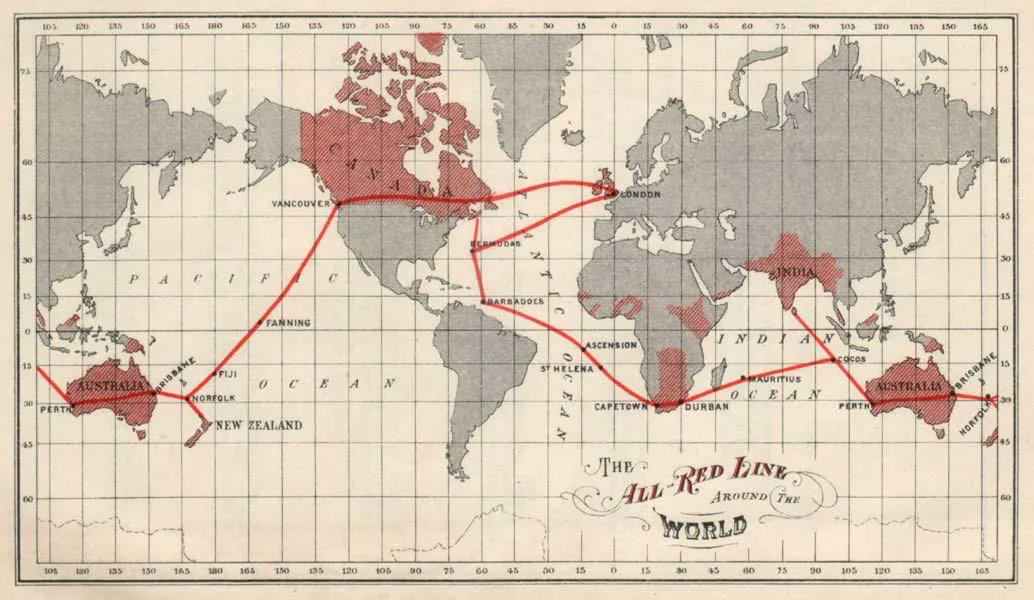
Another way the British Empire was held together was through the new technology of instantaneous communication, first by telegraph, and later by telephone and radio. To connect Britain with her colonies, a network of submarine cables were laid, from the 1850s onward. The cables are shown as red lines on this map, dated 1902.
The lands belonging to England included the whole continent of Australia, nearly half of North America, all of India, a third of Africa, part of Antarctica, and several smaller choice territories and islands. The addition of those lands gave London wealth almost beyond measure. It now had for itself the fabled wealth of the East: tea, cotton, rubber, mica and petroleum. It also had the wealth of Africa: diamonds, gold, more cotton, tobacco, asbestos, tin and zinc. On top of all this was England's energy, industry and financial skill.
At the empire's height, in 1920, it had more than 413 million subjects, or 23 percent of the world's population, This included 3 million Sudanese, a quarter million Malays, 220 million Indians, a quarter million Chinese, 30 million Black Africans, 7 million Burmese, and a quarter million Arabs. No wonder Queen Victoria replied with confidence, when she heard that South African rebels had won the first battles of the Boer War (1899-1902): "We are not interested in the possibilities of defeat. They do not exist."(19)
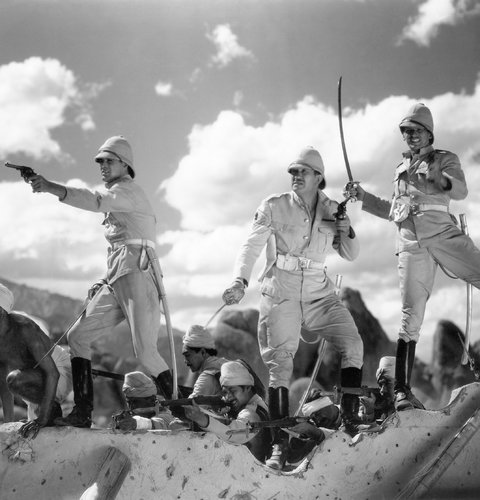
Despite their resources and power, the British preferred cooperating with friendly elements in native populations, rather than dominating them completely. In colonies that had a large community of white settlers, the result was a new kind of government called the Dominion. This worked a little bit like Austria-Hungary's Dual Monarchy; the British monarch remained the ultimate head of state over the colony, but the colony's internal affairs were completely independent, allowing it to pursue its own future. The Dominion kept economic ties and defense agreements with Britain through membership in an international organization called the Commonwealth of Nations. Canada was the first nation to receive Dominion status (1867), and the system worked so well that it was extended to Australia, New Zealand and South Africa in the first decade of the twentieth century. There are fifty members in the Commonwealth today.
The nineteenth century was four-fifths done before France re-entered the imperial game. In addition to the motives listed above, France was also driven by a desire to restore her pride, which had been lost, along with beloved Alsace-Lorraine, in the Franco-Prussian War. Within a generation the French conquered most of North and West Africa with the famous Foreign Legion; in Southeast Asia they had Vietnam, Cambodia, and Laos; as afterthoughts they also took Madagascar, island paradises like New Caledonia and Tahiti, and a good-sized portion of the Congo. By 1914 the French were in a respectable second place, with the Tricolor flying over 3,476,130 square miles, and France's chief executor of colonial policy, Louis Lyautey, spoke grandly, if inaccurately, of a France of a hundred million inhabitants.
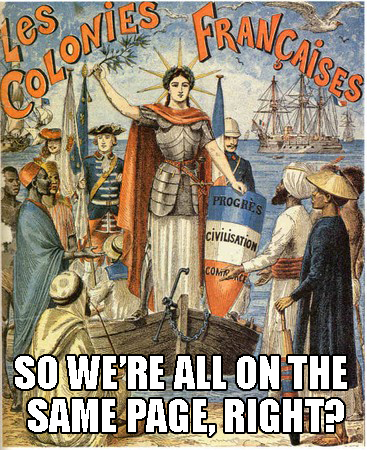
La Mission Civilisatrice is explained to France's colonial subjects.
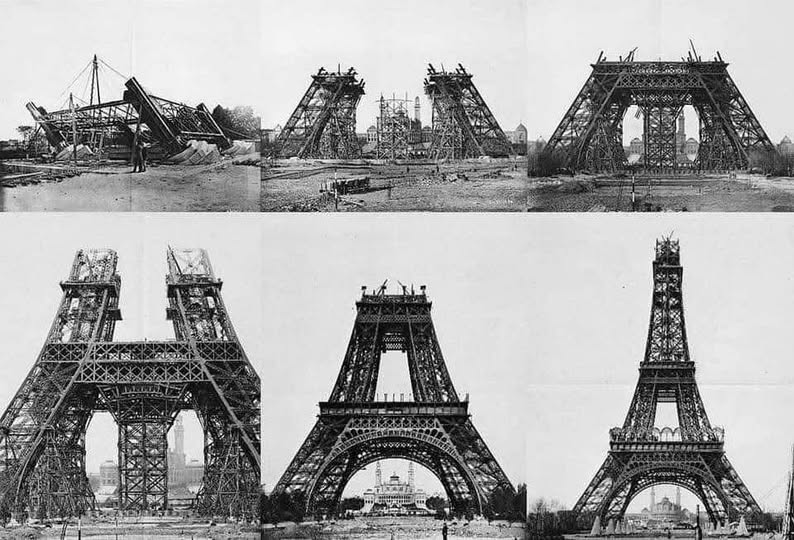
Earlier in this chapter we heard about a British engineering marvel, the Crystal Palace. For the 1889 World's Fair in Paris, the French raised an even more spectacular structure, the Eiffel Tower. Designed by the engineer Gustave Eiffel, the tower took two years to build; these photos show six stages in the construction. At first the artists and intellectuals of France called it a gargoyle, a monstrosity, and an abomination, but eventually they got used to it. Nowadays it is a symbol of France, and one of the most recognizable structures anywhere. Standing 1,083 feet high, it is the tallest building in Paris, and was the tallest building in the world for forty years, until New York City built first the Chrysler Building, then the Empire State Building. Nearly six million visitors come to the Eiffel Tower each year.
Late as a nation, Germany found the best overseas colonies already taken when it joined the race, but by 1914 the Black Eagle of the Second Reich had been raised over four African colonies, Micronesia and a quarter of New Guinea, giving the Germans 1,232,127 square miles and 11.8 million non-German subjects. Ironically, this enterprise was started by Bismarck, though he didn't really like it. Overseas adventures bored him, but because they kept the Germans from marching into other European countries, the old chancellor used them to satisfy Germany's thirst for territory. He also found that colonies could be swapped for land closer to home. An example of such a bargaining chip was the island of Zanzibar off East Africa, which he traded to the British for the North Sea island of Heligoland in 1890.
Wilhelm II had no such lofty motive. Germany was a great nation, and he would do anything to make it even greater. It was a blow to his pride that Holland, Belgium, and even Portugal had greater empires than his, so he armed Germany to the teeth, preparing for the major relocation of real estate he considered essential. The other European powers also armed to defend themselves from the kaiser's threat, beginning the arms race that would culminate with World War I.
Only a few words are needed to explain what the other European powers did. Russia first reached an agreement with Britain concerning Central Asia, then concentrated its attentions on Mongolia, northern China and Korea--until its sphere of influence ran into that of the Japanese. The days when the Dutch amazed everybody were over, but they still remained a wealthy nation by holding onto Indonesia, Surinam and a few Caribbean islands. Belgium got a place on the conference table because King Leopold II was the first Westerner to claim equatorial Africa, and when Bismarck seconded his claim the other powers chose to let him keep most of it; that became the Belgian Congo. Portugal hadn't counted for anything in three centuries, and because of that the Portuguese were left alone in the colonies they still had (Angola, Mozambique, part of Guinea, several islands in the Atlantic, and the Oriental outposts of Goa, Macao, and East Timor). Spain lost the last parts of her old colonial empire to the United States in 1898 (the Spanish-American War), but in a deal struck with the French over Morocco, managed to get a sparsely populated, phosphate-rich piece of the western Sahara. Italy moved into Africa cautiously; the Italians knew they were the worst fighters in Europe, so they only attacked where the natives were too helpless to resist. This unheroic strategy succeeded in landing them Eritrea, part of Somalia, and Libya, but backfired when the supposedly helpless Ethiopians trounced them (the battle of Adowa, 1896).
Demographics, 1871-1914
Europe's population increased by 42% in the period from 1871 to 1914, faster than ever before or since. The biggest gains, in both numbers and percentages, went to the nations that were in the lead already. Russia put on 92 million (a whopping 102% increase) and Germany gained twenty million (a 65% increase). Britain would have grown at the same rate as Germany, if it hadn't been for Ireland, which was still losing people; as it was, the United Kingdom only managed a 40% gain. This was still enough to give it, for the first time, a larger population than France. Austria-Hungary managed a 33% increase, which kept it ahead of everybody in total numbers except for Germany and Russia. The French performance was truly lamentable: a 10% increment. Of the five major powers, France now ranked fifth in population; it had slipped three places in the century after Waterloo. It also meant that France was the first modern nation to reduce the growth rate of its population, a trend that would affect the rest of Europe in future chapters of this work.
In the closing decades of the nineteenth century Germany displaced Britain as Europe's leading industrial power. The United Kingdom kept its traditional lead in coal mining, textiles and shipping, but around the turn of the century the German Empire caught up and passed it in iron and steel production, and was way out in front when it came to the new technologies--those involving electricity, chemicals, and mechanics.
Nothing on the map signaled Germany's new status better than the growth of its cities. In 1871 only Berlin, Hamburg and Breslau were big enough to be called cities; between them they contained a bare 4% of the population. By 1910 the number of towns qualifying had risen to twenty-five and the urban percentage of the population had likewise jumped to a quarter. London was still the largest city in Europe, but Britain couldn't match Germany's growth rate. The most impressive brick-and-concrete jungle was in the Ruhr valley; its four big towns--Essen, Dortmund, Duisburg and Bochum--were transformed from villages into Europe's most productive industrial unit in just two generations. From an economic perspective the other three major powers--France, Austria-Hungary and Russia--were left in the dust.
Also worth noting is that in the middle of the nineteenth century, two non-European nations industrialized: Japan and the United States. By the turn of the century both were rich enough and strong enough to make things happen in Europe. The Japanese announced they were a modern nation by mopping the floor with the Russians in the Russo-Japanese War (1904-5). Even more impressive was the coming of age of America. For Germany had not been the first nation to overtake Britain industrially; the United States did that in the early 1880s. After that time, continued growth took the USA into a class of its own; soon it forged more iron and steel than Britain and Germany put together, mined more coal than either, and produced two thirds of the world's oil, the fuel of the twentieth century, a resource most European countries didn't have at all. The New World had produced the first superpower.
A New Century Begins
As the twentieth century began, the general mood in Europe was one of unprecedented optimism. Technology, industry, science and society were all progressing at a faster rate than ever before. European civilization, which had been expanding since the 15th century, was now supreme around the globe and had brought everyone under its influence. It was an age of rising standards of living, faster transportation, longer life spans, more comfort, better health, growth in democratic government and personal liberty, humanitarian advances and a flowering of literature and art. Later on, the French would look back at the years between 1871 and 1914 and remember them as La Belle Epoche--the beautiful time.
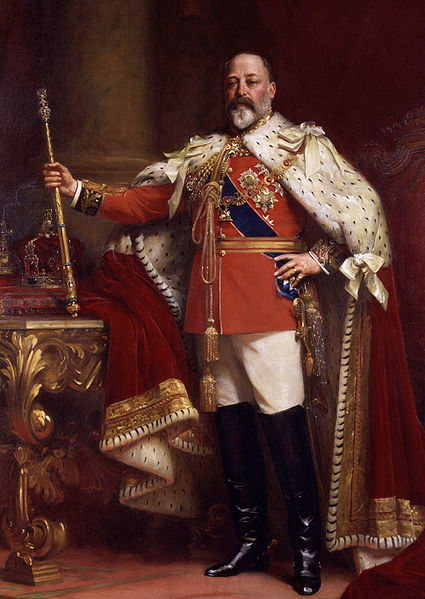
Edward VII.
Many people figured that Utopia was just around the corner, so this was a time for celebration. In England Edward VII, the former playboy Prince of Wales, succeeded Queen Victoria in 1901; his nine-year reign was a flamboyant era, where ladies and gentlemen wore dashing fashions instead of staid ones.(20) Across the Channel, Paris had become the "City of Light," the delightful home of impressionist painters and great writers. The French looked at the modern army across the Rhine and expected to fight Germany again some day, but for now they danced all night and hoped to hold back the day. It was a similar story in Vienna, the city of music and waltzes. Emperor Franz Joseph lived a Spartan lifestyle, rising at 4:30 AM and working late into the night, but his subjects were thoroughly Epicurean.
The neutral nations of northern Europe led the way when it came to social legislation, becoming the first to try out any new idea. The political laboratory was most developed in Sweden, Norway and Denmark, where socialism and capitalism were mixed to form cradle-to-grave economic protection for everybody, where "few should have more than they need, and fewer still should have less than they need." Women first received the right to vote in Norway, proportional representation had its first trial in Belgium, and Switzerland invented the referendum and ballot initiative. By contrast, Spain was still a pre-industrial country, a classic example of political incompetence and corruption, and thus failed to provide a better education and standard of living for its citizens. Not until the 1970s would the Spaniards get a real chance to set up a democratic government.
Portugal's story was very similar to Spain's. An 1820 coup had established a constitutional monarchy, but not everyone in the royal family liked that change. To turn the clock back to absolutism, King Carlos I appointed an anti-republican prime minister, João Franco, and gave him dictatorial powers (1906). It didn't work; two years later the king and his eldest son were shot dead in the streets of Lisbon. The second son of Carlos, Manuel II, became the next king, and though he restored constitutional government, he was as corrupt as his father. In October 1910 the army and navy led a revolution that deposed Manuel and established a republic. A liberal constitution went into effect in 1911, and Manuel José de Arriaga was elected to be Portugal's first president.
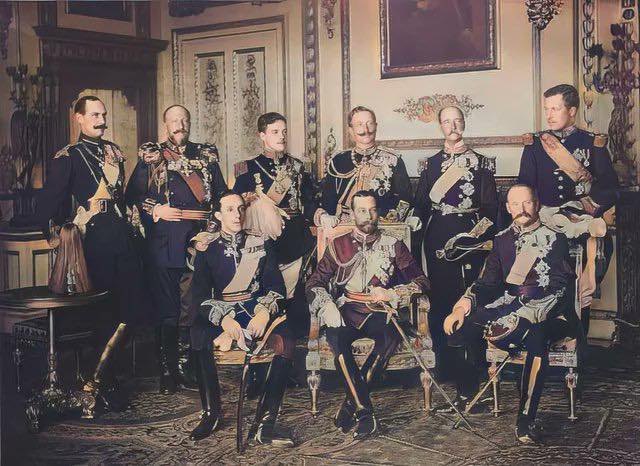
A few months before the coup in Portugal, Edward VII died, and nine European kings attended his funeral (see also footnote #20). Here is the kings' club. Standing, from left to right: King Haakon VII of Norway, Tsar Ferdinand of Bulgaria, King Manuel II of Portugal, Kaiser Wilhelm II of Germany, King George I of Greece and King Albert I of Belgium. Seated, from left to right: King Alfonso XIII of Spain, King-Emperor George V of the United Kingdom and King Frederick VIII of Denmark.
Through commerce and colonialism, Western civilization was eagerly promoted around the world. Most non-Western peoples, like it or not, were introduced to Western inventions and economics first, but gradually they also learned the Western secular faith that praised human rights, social justice, progress and the idea that man can find happiness on earth.(21) Along with this came other new ideas: self-government, nationalism, a promise that everyone can enjoy a better life, and the vision that cooperation between nations is better than competition.
The growth of trade, transportation and communication made the world seem smaller and encouraged moves toward internationalism. In 1865 a conference met in Paris to create the International Telegraph Union, which coordinated telegraph lines and rates between twenty nations. To make it easier to send mail across frontiers, the International Postal Union was set up in 1875. The first Pan-American Conference met in 1889 at Washington, D.C. to discuss economic interests and the maintenance of peace between eighteen nations in the Western Hemisphere. In 1896, a symbol of internationalism from ancient times, the Olympic games, was revived. In the eleven years preceding World War I, no less than 162 treaties were signed, establishing international laws and pledging cooperation on various matters.
Famous individuals as well as nations contributed to the peace movement. Alfred Nobel, the Swedish inventor of dynamite, established the Nobel Peace prize, and Andrew Carnegie, the American steel baron, founded the Carnegie Endowment for International Peace and built a Peace Palace at The Hague in the Netherlands, as a permanent neutral ground for future international meetings (ironically, the building was finished just before World War I began).
All of these accomplishments gave Europe--especially England, France and Germany--pride, exuberance and a belief that further progress would be inevitable. But examples of international cooperation were still less visible than examples of competition. Few at the time could see the result, that rivalry between competing nations would yield not a Utopia, but a harvest of unparalleled human destruction. And fewer could see that European colonialism was generating a wave of resentment that would one day end the white man's rule over the nonwhite world.
How NOT to Win Friends and Influence People
Though the political map of Europe stayed the same for decades, there were great changes underneath the surface. The most important of these was the growth of the German Empire. Bismarck had made Germany the strongest of the continental powers; by the turn of the century it was at least as strong as any two other European countries combined. This was bad all around. It made the Germans arrogant, and overly susceptible to the sort of master-race theories that most white people subscribed to at this time. The nation which had produced Friedrich Nietzsche and his concept of the "superman" now saw itself as the super-state.
Germany's hints at renewing the drang nach osten threatened the Russians to the point that they formed a defensive alliance with Germany's main enemy, France, in 1894. Talk about strange bedfellows--France was the most revolutionary nation in Europe, while Russia was the most reactionary! But instead of defusing tensions, the alliance increased the risk of war, because the allies had more people, giving them confidence that they could beat the Germans. What was really alarming was that the Germans didn't see any of this. If Bismarck had been around, he would have made undoing the Franco-Russian alliance his top priority, but now it caused very little concern.(22) Even worse, the British were scared enough of Germany's growing strength to bury the hatchet with France, ending a rivalry that had lasted for seven hundred years. In 1907 Britain joined France and Russia to create the Triple Entente, matching the Triple Alliance of Germany, Austria-Hungary and Italy. The Germans didn't care; they were confident that they could take on all three Entente members at the same time and beat them.
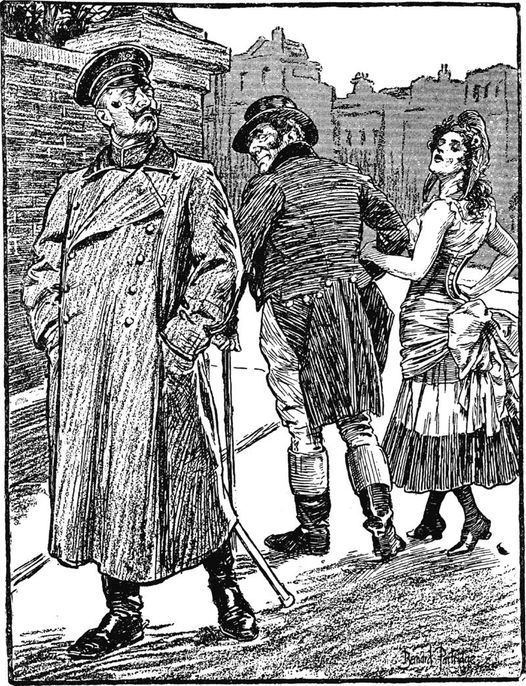
A 1904 cartoon about improving Anglo-French relations shows Kaiser Wilhelm II of Germany scowling at John Bull (Britain) and Marianne (France), as the latter two go on a date.
Europe's six most important nations were now evenly divided between two armed camps, and the lesser nations rushed to join one or the other bloc, polarizing the whole continent. In a time of prolonged peace, most European nations also built up their armies. Bismarck had never cut back on the German army, because it was the tool he had used to keep Germany united; universal conscription enlarged it from 400,000 men in 1871 to 820,000 in 1914. France matched each increase, so the French had 750,000 men under arms by 1914; Italy and Austria-Hungary did likewise. After the humiliation of the Russo-Japanese War, the Russians also enlarged their armed forces, figuring that this was the quickest way to get their pride back. As the armies grew, each diplomatic crisis became harder to resolve, adding to the increasing tensions.
If anyone was responsible for the arms race and the attitude of militant nationalism, it was Germany's vain and tactless emperor, Kaiser Wilhelm II. An accident at birth left him with a withered, nearly useless left arm; he tried to hide that arm from cameras and overcompensated by showing himself--and Germany--as strong, whenever he got the chance. Thus, he loved anything that had to do with the military. Germans admired him, but his bully-boy behavior offended foreigners, including his closest ally, Franz Joseph. On an 1888 state visit to Vienna, for instance, he demanded that all other visiting monarchs leave before his arrival. Austria-Hungary usually tolerated the kaiser's whims, but a year later Franz Joseph retaliated. For the funeral of his son, he dispatched a wave of identical telegrams to Europe's heads of state, announcing that they did not have to come because the funeral would be a private family affair. To the kaiser, however, he sent a personal request--to stay away from Vienna.
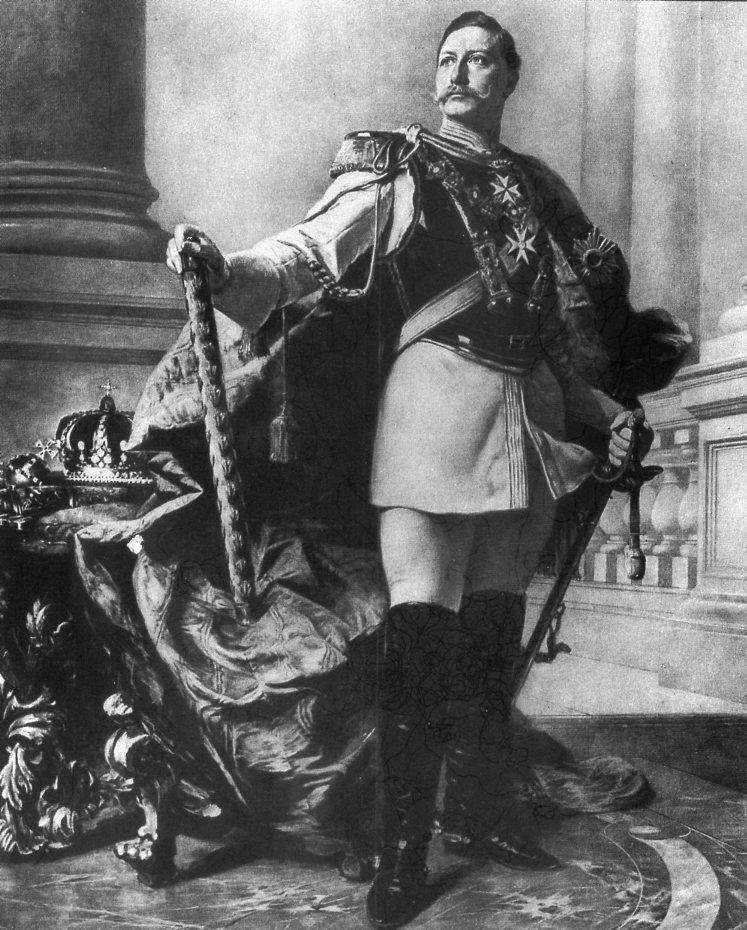
Wilhelm II in 1890. For this painting he took a stance so provocative that a French general remarked, "That is not a portrait, that is a declaration of war."
Queen Victoria was the kaiser's maternal grandmother, but that didn't stop him from adding Britain to the list of Germany's enemies. In 1895 he congratulated the leader of the white South Africans (Boers), Transvaal President Paul Kruger, for crushing a British raid. Two years later the British decided to annex the Transvaal, and the kaiser announced that he would take the Boers under his protection. Britain was understandably furious, and so was the kaiser when he realized that he couldn't do anything about South Africa because he didn't have a fleet. He threw his influence behind a naval construction program designed to give Germany a first-class navy within twenty years. The British could ignore the build-up of armies on the Continent, but not a threat to the Royal Navy; being an island, Great Britain depended on overseas commerce, and would starve if it could not trade. By contrast, the United States was building up its navy at the same time, under Presidents McKinley and Roosevelt, but only in the Caribbean did their ships come near British territories, so Britain did not see the American fleet as a threat.
Britain responded to the German threat with a naval build-up of her own. In 1906 Britain launched the first true battleship, the H.M.S. Dreadnought. 11-inch armor plate, ten 12-inch guns, and a top speed of 21 knots made the Dreadnought the largest and fastest warship ever built up to that time. Because the Dreadnought could outfight and outrun any other warship, its launching immediately made the whole German fleet obsolete. When Germany responded by building German battleships, the breach with Britain became permanent.
Another African venture showed just how far the Germans were getting ahead of themselves. In 1905 the French put the last touches on a plan they had for taking over Morocco; they had settled their differences with the British (by dropping their century-old claim to Egypt), the Italians (by agreeing to let them have Libya), and the Spaniards (by offering them a share). But before they could move in and raise the Tricolor, the kaiser made his special contribution. Sailing to Tangiers, he declared that Germany still regarded Morocco as a fully independent state. France would have to back down in a public announcement at an international conference.
France did no such thing. Encouraged by the British, the French stood firm at the conference (held in Algeciras, Spain, in January 1906), and it was Germany--who had the support of no one but Austria-Hungary--that was forced to change its position. France's "special position" in Morocco was recognized by all other nations involved in the matter. The kaiser thought he could drive a wedge between Britain and France, but instead the crisis strengthened the bond between those two former enemies.
A second Moroccan crisis occurred in July 1911, when the French were ready to move in again. This time the Germans sent a gunboat, the Panther, to the port of Agadir, in the hope of provoking native resistance to the French, and they declared that the purpose of the ship was to "protect German citizens." The problem with this statement was that the only German in Morocco at the time was a businessman in Mogador, seventy miles away. In a scene that sounds like a movie comedy, the Germans sent a telegram to this fellow, telling him to go to Agadir; he did so and ran around on the beach, pretending to be in danger, until the German ship "rescued" him! Still, the French nervously gave in to the German threat, until the British, who were never fooled, said they would support the French claim. More negotiations followed, and this time Germany agreed to stop interfering in Morocco in exchange for a strip of territory in central Africa. As with the first crisis, the main result was a reinforcement of good Anglo-French relations.
The alienation of the British should have been a warning to Germany's super-patriots, but it acted as a spur instead. The naval program was accelerated. In 1908 the kaiser offended Britain, France, and Russia all at once by insisting that the naval expansion was directed against Japan; this transparent lie fooled no one. By 1914 the British had 19 battleships and 13 more under construction, while the Germans had 13 battleships at sea and seven in the shipyards. The Kiel Canal was dug through Holstein so that German ships could sail between the North and Baltic Seas without leaving the safety of German territory; it was finished just months before World War I broke out. Russia felt threatened when the Germans supported Austria-Hungary's annexation of Bosnia-Herzegovina. And Austria-Hungary was encouraged to think that if she acted aggressively in the Balkans, she could count on German backing.
The Powder Keg of Europe
Austria-Hungary's Slavic problem grew worse as the twentieth century began. The Slavs had a higher birthrate than non-Slavs like the Hungarians, and as we saw earlier, Slavic nationalism gave both Vienna and Budapest the creeps. Now that the Slavs made up 47% of the empire's population, their desire for independence threatened to give the empire another crisis of identity.
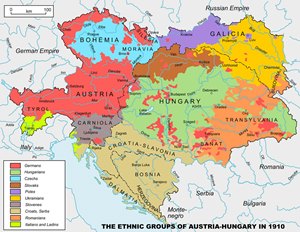
Austria-Hungary's pre-World War I ethnic makeup, in 1910. Click on the thumbnail for a full-sized map (286 KB, opens in a separate tab). From AuthenticHistory.com.
However, the Slavs had an identity problem of their own. The Russians proposed bringing all Slavs into a single superstate (pan-Slavism), but the Slavs could not be easily united. The Slavs of the Balkans were separated from the Slavs of northeastern Europe by the presence of the non-Slavic Germans, Hungarians and Romanians; there was an equally deep emotional divide between the Catholic Poles and Orthodox Russians. A glance at the above map might suggest that the main threat to Austria-Hungary lay in the north, where the main Slavic state, Russia, faced Austria-Hungary's (Polish & Ukrainian-populated) province of Galicia. Far from it; the Poles and Ukrainians wanted nothing to do with a Slavic state run by Russians. If staying with Austria or joining Russia were their only choices, they would stay put. Franz Joseph never had a problem with Galicia.
The other Slavs were another matter. The Czechs and Slovaks liked the idea of pan-Slavism enough to form a state containing both of them, Czechoslovakia, when they got their chance at independence (after World War I). In the Balkans the Serbs, Croats, Slovenes, Bosnians, Montenegrins, Macedonians and Bulgars had enough in common for some to propose a single Yugo-Slav (southern Slavic) state. That idea appealed least to the groups farthest east and west: the Croats and Slovenes (who were Catholic and thus regarded themselves as Western Europeans), and the Bulgars (who already had a state of their own). It was the Slavs in the middle of the Balkans, the Serbs, who became Yugoslavia's most enthusiastic proponents. They spread the gospel of pan-Slavism to their neighbors in Bosnia, Herzegovina and Montenegro with considerable success.
The Austrians tried to stop the pro-Serb drift in Bosnia and Herzegovina by annexing them in 1908. This was an illegal act--the 1878 Berlin treaty only allowed them to occupy those two former Turkish provinces for thirty years--and the Serbs were outraged enough to make a continent-wide crisis of it. They appealed to the Russians in the name of pan-Slavism, and Russia protested to the Germans and Austrians at this violation of the treaty. But Russia was in no condition to fight--the country was still recovering from the Russo-Japanese War and an unsuccessful 1905 revolution--and the Germans knew it. They rejected the Russian protests and encouraged the Austrians to do the same. The Russians had to swallow their pride and tell themselves--and the Serbs--to wait for a better day.
For Franz Joseph to annex Bosnia was one thing, to win the hearts of the Bosnians (who were 30% Serbian) was another. Across the border, leadership among the Serbs alternated between two families, the pro-Austrian Obrenovichi and the pro-Russian Karageorgevichi. As long as an Obrenovich king ruled Serbia, reconciliation was possible, but in 1903 the last one, Alexander I, was assassinated, and his Karageorgevich successor, Peter I, seemed determined to put Belgrade on a collision course with Vienna.
Despite this, one Hapsburg still offered friendship to the Slavs--the nephew and heir to the emperor, Archduke Franz Ferdinand. He favored a reorganization of the imperial system to share more power with the Slavs, presumably by transforming the empire into a confederation of states, with one or more Slav-ruled governments to offset the Austrian and Hungarian ones. Unfortunately for him, his ideas were never popular with Franz Joseph, because of his marriage to Sophie Chotek, a Czech lady from a family that wasn't blue-blooded (read: inbred and elitist) enough for the emperor. Franz Ferdinand had to give up the right of his future children to inherit the throne before the emperor would allow the marriage to take place (June 28, 1900). Afterward, Franz Joseph showed his disapproval by only allowing Sophie to call herself a duchess; this meant that she couldn't ride in a royal carriage or sit with her husband in an opera house, and all the Hapsburg archduchesses took precedence over her. However, it was too late for the emperor to find another heir, and because of the emperor's age (78 at the time of the Bosnia-Herzegovina crisis), Franz Ferdinand must have felt it wouldn't be long before he got his chance to put the empire on a new course.
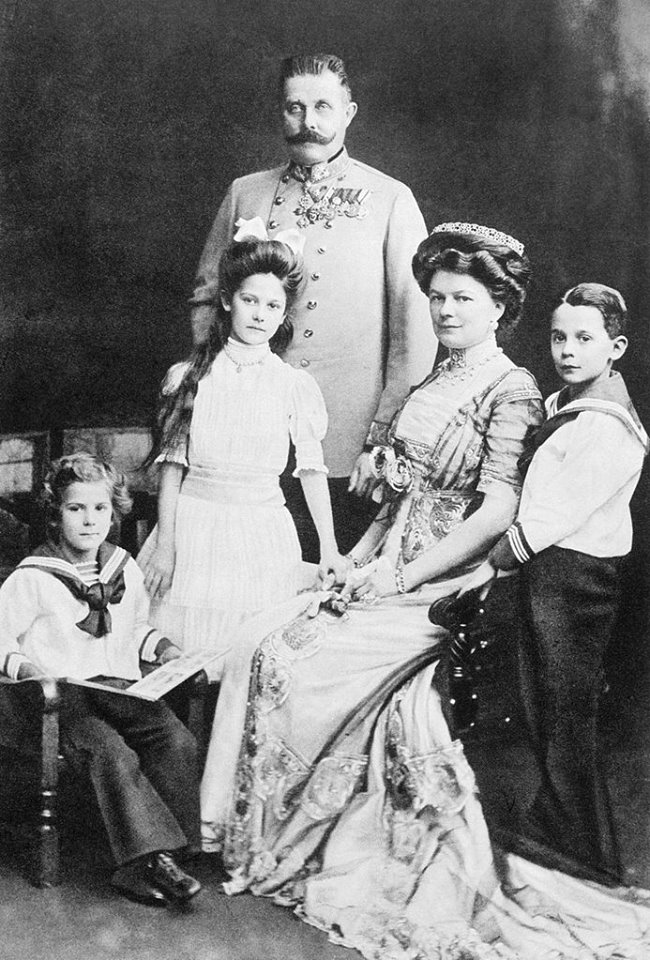
The Archduke Franz Ferdinand with his wife Sophie, and their three children (from left), Prince Ernst von Hohenberg, Princess Sophie, and Maximilian, Duke of Hohenburg. Taken in 1910.
The next round of Balkanization was the First Balkan War (October 1912-May 1913). The Serbs, Montenegrins, Greeks and Bulgars came to the conclusion that if they acted together they would be strong enough to take away Turkey's last European provinces (Novipazar, Macedonia, Albania and Thrace). Within a month the Bulgars had reached the gates of Constantinople (though they were repulsed when they got there), there were Montenegrins & Serbs in Albania, the Serbs had taken Skopje and the Greeks were closing in on Salonika. By the end of 1912 there was nothing the Turks could do but ask for a truce. There was a round of fighting over Edirne (ancient Adrianople) in early 1913, but this merely served to confirm the original result. The victors divided Novipazar between Montenegro and Serbia, and Macedonia between Serbia and Greece, while Bulgaria got most of Thrace. Turkey's only hope was that the alliance against it would fall apart.
This happened remarkably quickly. The Bulgars, angry because they had fought the hardest but gained less than the Serbs and Greeks, quietly switched their army from east to west and fell on their allies. This treachery didn't pay; they were quickly beaten back to their own lines and, while their forces were committed to this unsuccessful foray, the Turks struck and recovered Edirne. Bulgaria also lost its northeastern corner, the southern Dobruja, to a Romanian invasion. The frontiers agreed to at the end of the Second Balkan War (June-July 1913), humiliated the Bulgars as much as they did the Ottomans. Serbia and Greece emerged from the two wars 50% bigger, and increased their populations proportionately (from 3 to 4.5 million); by contrast, Bulgaria's losses nearly canceled out her gains.
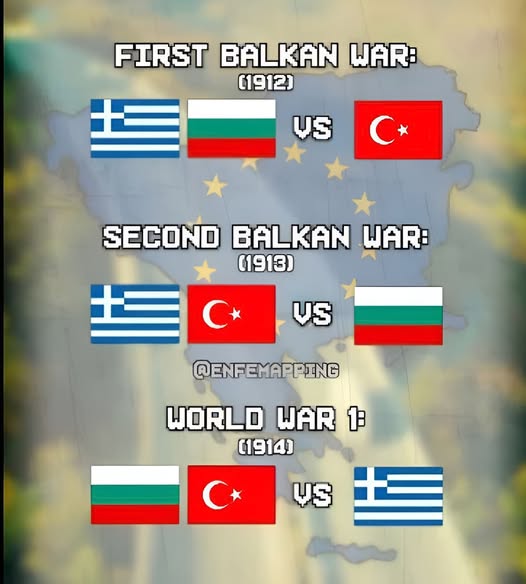
How Greece, Bulgaria and the Ottoman Empire were aligned, in each of the Balkan Wars. For the Third Balkan War (WWI), see the beginning of the next chapter.
The two Balkan wars also created a new kingdom, Albania. The one million Albanians, descendants of the ancient Illyrians, were 70 percent Moslem, so most of them were inclined to stay loyal to the Turks. Nevertheless, in 1911 the king of Montenegro started revolts among the Albanians of Kosovo and northern Albania, in the hope that this would give him an excuse to grab Albania and Kosovo for Montenegro. These revolts, together called the Malissori Uprising, lasted for five months (March-August 1911) and were eventually put down by the Turks. At the end of the Balkan Wars, a joint international peacekeeping force, led by the British, occupied Albania because the Turks were now too far away to defend it. When independence came to Albania later in 1913, it wasn't because of the infant Albanian nationalist movement, but because of Austria-Hungary's determination to keep the Serbs landlocked. The Austrians insisted that the Albanians should not become part of Serbia because they were not Slavs (true), and at the international conference that decided the new frontiers they got their way.
Albania had a hard time getting started. The great powers and the Albanians agreed to crown a Protestant German prince, Wilhelm of Wied, as Albania's first king. But this was a country run by rural clans and vendettas; six factions arose, each claiming to be the legitimate government. The new king spent six months trying to muddle through the situation, before giving up and returning to Germany. After that the Albanians had no government at all; at one point they offered their vacant throne to any English or American gentleman with an annual income of £10,000 or more, and even then nobody accepted. Finally in 1925 a local politician, Ahmed Bey Zogu, became the president, and later crowned himself King Zog I.
The 1913 settlements did no more to solve the Balkan problem than previous solutions had. Austria-Hungary was more fearful than ever of the Yugoslavia movement, and as Serbia grew larger, so did its ambitions. The Serbian prime minister was quoted as saying, "The first round is won; now we must prepare [for] the second against Austria." Many Serbs at this stage would have welcomed a general European war as an opportunity to grab Albania and/or Bosnia-Herzegovina. As for Russia, its dream of pan-Slavism had not been shattered but only interrupted. By 1914 the tensions could be felt by all. An American visiting Europe that spring wrote: "The whole of Germany is charged with electricity . . . It only needs a spark to set the whole thing off." Around the same time the German ambassador in Paris said, "Peace remains at the mercy of an accident." The next conflict in the powder keg of Europe would produce an explosion big enough to engulf the whole continent, because this time every major power would get involved in it.(23)
This is the End of Chapter 13.

FOOTNOTES

13. Liechtenstein was left out because of its location between Austria and Switzerland; Austria's withdrawal from the German Confederation left Liechtenstein isolated from the other members, and because the mini-state is so small, nobody even noticed. Still, it sent soldiers to support Prussia in the next conflict, the Franco-Prussian War, but they arrived too late, and thus missed the fighting. Thirty soldiers left Liechtenstein, and because they picked up a Prussian deserter on the way back, thirty-one returned. This is one of the few times when an army finished a war in the black!
14. The French invented the first machine gun, the Mitrailleuse. It had twenty-five barrels mounted on a gun carriage and could shoot 150 rounds/minute, giving it an even greater firepower advantage over the breach-loading rifle than the breach-loader had over the muzzle-loader. Had it been used properly, it could have won the Franco-Prussian War for the French. But so much secrecy surrounded the new invention that hardly anyone knew how to use it. Consequently the machine gun would first be used in colonial battles (like in Africa); not until World War I would it make a difference in a battle between Europeans.
15. This marks the completion of the Risorgimento; the whole peninsula was now united under one government, with the exception of two flyspeck states (San Marino and the Vatican). Garibaldi allowed San Marino to remain independent as a reward for the role it played in his escape, after the 1848 revolutions failed. There were still more than half a million Italians, however, in the nearest provinces of Austria, Istria and the South Tyrol. Italian politicians frequently declared their desire to annex those provinces, calling them Italia Irridenta (unredeemed Italy). That was the main reason why Italy joined the enemies of Austria in World War I, and it gave the word irridentism to our political vocabulary.
The popes did not take the loss of the Papal State very well. This is probably why the pope at the time, Pius IX, proclaimed the dogma of papal infallibility during the same year. For more than half a century afterwards, the popes refused to leave the land left to them, which was mainly St. Peter's Cathedral and its square. Relations between the popes and the Italian state did not begin to improve until Benito Mussolini became dictator of Italy (see Chapter 15). The Lateran Treaty, signed in 1929, created the present-day Vatican City as the pope's domain. Pope Pius XI celebrated the passage of the treaty by leaving St. Peter's to visit one of the places returned to the Papacy, the Lateran Palace. Incidentally, this was the first time that a pope took a ride in a car; the Popemobile was still decades in the future!
16. For those of you who are counting, the First Reich was the Holy Roman Empire.
Most of the kings, princes, and dukes of the former German Confederation were pensioned off, meaning that they gave up their political power for a large sum of money. One of those rulers is worth mentioning here: Ludwig (Louis) II, the last king of Bavaria. He never seemed to have a firm grip on reality; in fact, he wanted to be a fairytale king, instead of a 19th-century constitutional monarch. Disliking Bismarck, he refused to go to Versailles, claiming that he had a toothache, and sent a representative in his place. He loved Richard Wagner's operas, and became his principal patron; the three castles he built were so fancy, both inside and out, that one of them later became the model for Cinderella's castle at Walt Disney World. As time went on, though, he became obsessed with his fantasy. By 1886 his castles had nearly drained the Bavarian treasury, so the king's court declared Ludwig insane and removed him from the throne. Three days later Ludwig and his doctor were found dead in a lake near Munich; although the timing of the incident was suspicious, it was declared at the time that they had drowned themselves. To this day it has never been determined whether this was a suicide or a murder.

Louis II's Neuschwanstein Castle.
17. At the date of this writing, the Third Republic has been the longest-lived of all modern French governments, lasting for sixty-nine years (1871-1940). To beat that record, the current Republic (the Fifth) will have to endure until 2028.
18. Moltke always refused to spend money on fortresses, saying that it did more good to build new railroads. He knew what he was talking about; carefully planned mobilization schedules, coupled with railroad timetables, were the cornerstone of his strategic planning, and the reason why the Prussian army got off to such a good start in both 1866 and 1870.
19. When you have a great empire, you can expect its soldiers to go almost anywhere. In 2012 a book came out on how the British did that, All the Countries We've Ever Invaded: And the Few We Never Got Round To. The author, Stuart Laycock, calculated that at one time or another, British troops invaded 90 percent of the 200 or so countries in today's world; this includes raids by pirates, privateers or armed explorers who had London's blessing. Here are the flags of the 22 countries that have never been invaded by Great Britain. When The Daily Telegraph heard about this, one of its reporters warned, "Look out, Luxembourg!"
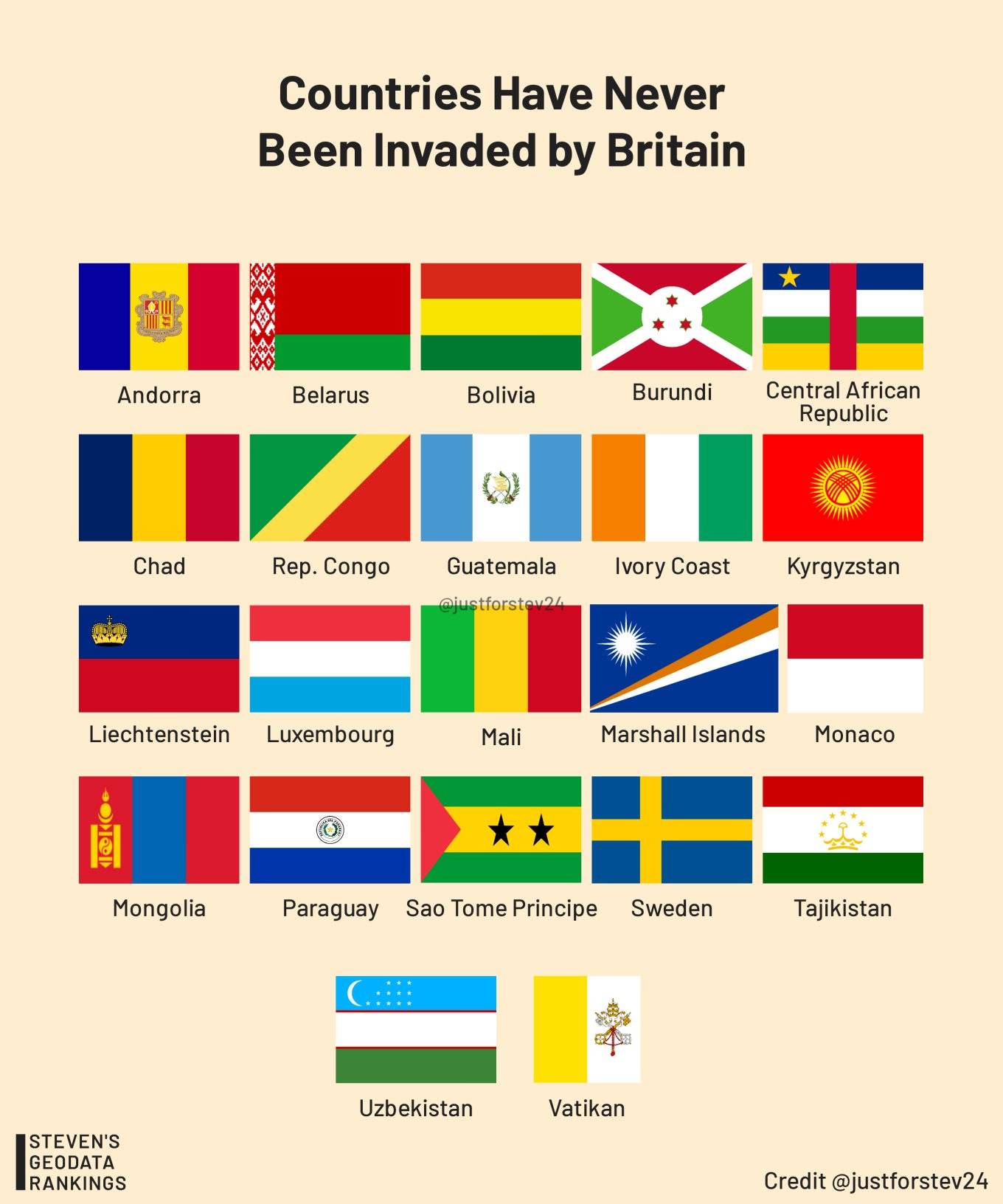
20. Edward VII could act like a proper king when performing his royal duties; he had forty years of practice, because Queen Victoria rarely wanted to appear at public functions after Prince Albert died in 1861, forcing Edward to take her place. However, he did not give up his racy lifestyle. He was known for drinking and gambling; the gambling included horse racing and baccarat, an illegal card game. In addition, he kept mistresses and chased other women who caught his eye. All this continued after he became king. Indeed, there are reports that Edward signed the Entente Cordiale treaty (see the next section), making Britain and France formal allies, so that the king could claim he was on official business while visiting the brothels of France. This was quite a feat, considering that as recently as 1898, the two countries almost went to war in Africa, over who would get present-day Sudan. When Edward died his longsuffering queen, Alexandra of Denmark, said, "Well at least now I'll know where he is."
21. Those who read Chapter 2 will recognize this philosophy as humanism, an outgrowth of the ideals praised by ancient Greece. In that sense, the whole modern world has been colonized by Greek culture.
22. As late as 1887, Bismarck tried to forge an anti-French alliance with Britain. He deliberately avoided building a German navy, to keep the British friendly.
23. In 1913 Archduke Franz Ferdinand said, "A war between Austria and Russia will end either with the elimination of the Romanovs or that of the Hapsburgs, perhaps both." He was dead right about that prediction.
Support this site!

PAGE NAVIGATOR
A History of Europe
|
Other History Papers |
Beyond History
|
